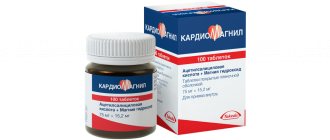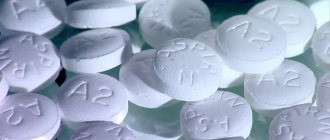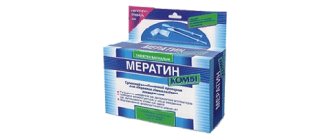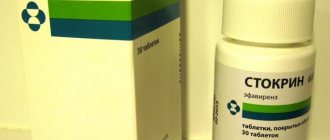For the treatment and prevention of heart and vascular diseases, a modern drug, Cardiomagnyl, was created based on acetylsalicylic acid.
The main purpose is to prevent thrombus formation and blockage of blood vessels with blood clots, to prevent heart attacks and strokes.
Types and composition
The drug is presented in pharmacies in two types of tablets:
- heart-shaped with 75 mg of the main substance;
- oval shaped with a notch for ease of dividing into two parts with a dosage of 150 mg.
Each piece is covered with a film shell and contains acetylsalicylic acid as an active ingredient, as well as magnesium hydroxide.
Additional elements are represented by corn starch, talc, cellulose, magnesium stearate, propylene glycol, potato starch.
Cardiomagnyl tablets are packaged in tinted glass jars with a label of 30 or 100 pieces. Manufacturer: Nicomed, Denmark.
For what diseases is it prescribed?
Instructions for use of Cardiomagnyl provide for the possibility of taking it for:
- myocardial damage caused by the absence or disruption of blood supply to the heart muscle - coronary heart disease;
- pre-infarction state;
- myocardial infarction;
- exacerbation of ischemic heart disease;
- secondary prevention of blood clots and vascular thrombosis, myocardial infarction, stroke;
- prevention of thrombosis and acute cardiovascular pathologies in people over 50 years of age and at risk due to excess weight, high blood pressure, atherosclerosis, diabetes mellitus, high cholesterol levels in the blood, and failure of the metabolism of fats and carbohydrates.
As a preventive measure, it is prescribed after vascular operations: stenting, coronary artery bypass grafting, angioplasty. Cardiomagnyl is also taken to prevent the formation of blood clots in the veins of the lower extremities and blockage of large vessels of the lungs after prolonged immobility due to surgery.
Cardiomagnyl®
The drug should be used after a doctor's prescription.
ASA can provoke bronchospasm, as well as cause attacks of bronchial asthma and other hypersensitivity reactions. Risk factors include a history of bronchial asthma, hay fever, nasal polyposis, chronic respiratory diseases, and allergic reactions to other drugs (for example, skin reactions, itching, urticaria).
ASA can cause bleeding of varying severity during and after surgery. Several days before planned surgery, the risk of bleeding should be assessed in comparison with the risk of ischemic complications in patients taking low doses of ASA. If the risk of bleeding is significant, ASA should be temporarily discontinued.
The combination of ASA with anticoagulants, thrombolytics and antiplatelet drugs is accompanied by an increased risk of bleeding.
ASA in low doses can trigger the development of gout in predisposed patients (those with reduced excretion of uric acid).
The combination of ASA with methotrexate is accompanied by an increased incidence of side effects from the hematopoietic organs.
High doses of ASA have a hypoglycemic effect, which must be kept in mind when prescribing it to patients with diabetes mellitus receiving oral hypoglycemic agents and insulin.
When using systemic glucocorticosteroids (GCS) and salicylates in combination, it should be remembered that during treatment the concentration of salicylates in the blood is reduced, and after discontinuation of systemic glucocorticosteroids (GCS), an overdose of salicylates is possible.
The combination of ASA with ibuprofen is not recommended in patients with an increased risk of cardiovascular diseases: when used simultaneously with ibuprofen, there is a decrease in the antiplatelet effect of ASA in doses up to 300 mg, which leads to a decrease in the cardioprotective effects of ASA.
Exceeding the dose of ASA above the recommended therapeutic doses is associated with the risk of gastrointestinal bleeding. With long-term use of low doses of ASA as aggregative therapy, caution must be exercised in elderly patients due to the risk of gastrointestinal bleeding. When taking ASA simultaneously with alcohol, there is an increased risk of damage to the mucous membrane of the gastrointestinal tract and prolongation of bleeding time.
How does Cardiomagnyl work?
The mechanism of action is due to the combined composition. Acetylsalicylic acid has a negative effect on the gastrointestinal mucosa and can lead to peptic ulcers or provoke a relapse of an existing disease. Magnesium hydroxide is a hydrochloric acid neutralizer, added to protect the stomach lining from the aggressive effects of aspirin.
Acetylsalicylic acid is a non-steroidal anti-inflammatory drug that has analgesic and antipyretic effects. The dosage of the substance in Cardiomagnyl allows:
- reduce blood clotting;
- prevent platelet clumping;
- prevents the formation of blood clots in large vessels.
What is Cardiomagnyl?
Cardiomagnyl is an antithrombotic agent that is used for the primary prevention of cardiovascular diseases. The active component of Cardiomagnyl is acetylsalicylic acid (aspirin). It exerts its therapeutic effect due to the fact that it suppresses the action of cyclooxygenase (COX), an enzyme that takes part in the formation of thromboxanes (substances that contribute to the connection of platelets with each other). Thus, aspirin has anti-clotting and blood thinning properties.
There is also a variety of Cardiomagnyl containing magnesium hydroxide. Magnesium hydroxide is an antacid (heartburn medicine) that helps reduce the negative effects of aspirin on the gastrointestinal tract.
Contraindications and side effects
The use of Cardiomagnyl must be approved by a doctor, since the drug has serious contraindications:
- excessive sensitivity to aspirin or any other component;
- intolerance to non-steroidal anti-inflammatory drugs;
- acute period of erosive and ulcerative lesions of the gastrointestinal tract;
- hemorrhagic stroke;
- predisposition to bleeding;
- bronchial asthma provoked by the use of NSAIDs or salicylic acid derivatives;
- gastrointestinal bleeding;
- severe kidney dysfunction;
- deficiency of the enzyme glucose-6-phosphate dehydrogenase;
- taking with the antitumor drug Methotrexate (in an amount of more than 15 mg per week);
- I and III trimesters of pregnancy, breastfeeding.
Prescribed with caution for gout, in the second trimester of pregnancy, with an increase in the amount of urate in the blood, ulcers and bleeding of the gastrointestinal tract in the past, dysfunction of the liver and kidneys, allergic conditions, bronchial asthma.
The following side effects were identified:
- nettle rash;
- angioedema;
- discomfort in the stomach - heartburn, ulcerative lesions of the gastric epithelium, bleeding, nausea, abdominal pain;
- intestinal irritation, inflammation of the colon mucosa;
- inflammation of the mucous membrane of the esophagus or oral cavity;
- bronchospasms;
- headache, sleep disturbances or drowsiness, dizziness;
- the appearance of bleeding, a decrease in hemoglobin levels, a critical decrease in platelet levels, a decrease in the number of neutrophils in the blood.
Instructions for use Cardiomagnyl tablets 150 mg 100 pcs
The drug should be used after a doctor's prescription. ASA can provoke bronchospasm, as well as cause attacks of bronchial asthma and other hypersensitivity reactions. Risk factors include a history of bronchial asthma, hay fever, nasal polyposis, chronic respiratory diseases, and allergic reactions to other drugs (for example, skin reactions, itching, urticaria). ASA can cause bleeding of varying severity during and after surgery. Several days before planned surgery, the risk of bleeding should be assessed in comparison with the risk of ischemic complications in patients taking low doses of ASA. If the risk of bleeding is significant, ASA should be temporarily discontinued. The combination of ASA with anticoagulants, thrombolytics and antiplatelet drugs is accompanied by an increased risk of bleeding. ASA in low doses can trigger the development of gout in predisposed patients (those with reduced excretion of uric acid). The combination of ASA with methotrexate is accompanied by an increased incidence of side effects from the hematopoietic organs. High doses of ASA have a hypoglycemic effect, which must be kept in mind when prescribing it to patients with diabetes mellitus receiving oral hypoglycemic agents and insulin. When using systemic glucocorticosteroids (GCS) and salicylates in combination, it should be remembered that during treatment the concentration of salicylates in the blood is reduced, and after discontinuation of systemic glucocorticosteroids (GCS), an overdose of salicylates is possible. Metamizole and some NSAIDs (including ibuprofen, naproxen) can weaken the inhibitory effect of ASA on platelet aggregation. Patients taking ASA and planning to take metamizole or NSAIDs should discuss this with their doctor (see section "Interactions with other drugs"). Exceeding the dose of ASA above the recommended therapeutic doses is associated with the risk of gastrointestinal bleeding. With long-term use of low doses of ASA as aggregative therapy, caution must be exercised in elderly patients due to the risk of gastrointestinal bleeding. When taking ASA simultaneously with alcohol, there is an increased risk of damage to the mucous membrane of the gastrointestinal tract and prolongation of bleeding time. In patients with impaired renal function or in patients with circulatory impairment resulting from damage to the renal arteries, chronic heart failure, hypovolemia, major surgery, sepsis or cases of massive bleeding, Cardiomagnyl should be used with caution, since ASA may increase the risk of developing acute renal failure and renal dysfunction. In severe forms of glucose-6-phosphate dehydrogenase deficiency, ASA can cause hemolysis and hemolytic anemia. Factors that may increase the risk of hemolysis include fever, acute infections and high doses of the drug. Medicines containing ASA should not be used in children and adolescents to treat viral infections with or without fever without consulting a doctor. Certain viral illnesses, such as influenza A, influenza B and chickenpox, are at risk of developing Reye's syndrome, a very rare but life-threatening illness that requires immediate medical attention. The risk may be increased if ASA is used as concomitant therapy, but a causal relationship has not been confirmed. Uncontrollable vomiting in these diseases may be a symptom of Reye's syndrome. When using the drug independently, you should not exceed the maximum duration and recommended doses. If there is no improvement or if the symptoms of the disease worsen, it is recommended to consult a doctor.
How to take Cardiomagnyl tablets
In accordance with the instructions, the tablet can be taken in different ways: swallowed whole, divided into two parts, chewed, crushed or dissolved in water. The best time to take it is at night.
The dosage of Cardiomagnyl is selected depending on the indications. For example, for the initial prevention of thrombosis and heart failure in people at risk, one 150 mg tablet is prescribed on the first day, then Cardiomagnyl 75 mg, one tablet once a day.
To prevent recurrent cases of heart attack or blockage of large vessels by blood clots - one tablet at a dosage of 75-150 mg once a day.
To prevent complications after vascular surgery - one tablet 75-150 mg once a day.
For exacerbations of IHD, one tablet with a dosage of 75-150 mg is prescribed once a day.
The duration of treatment is determined by the doctor individually from one to 6 months. Reception can be continued after a break of 14 to 28 days.
What are the side effects of Cardiomagnyl?
Side effects from Cardiomagnyl depend on the dosage, duration of use of the drug and the characteristics of the patient.
The most common side effect of the drug is stomach problems due to the effect of aspirin on the upper gastrointestinal tract.
The negative effect of the drug is manifested in:
- increased bleeding time;
- headache;
- dizziness, drowsiness;
- bronchospasm in a patient with asthma;
- heartburn, acid reflux, abdominal pain;
- inflammatory lesions of the upper gastrointestinal tract;
- nausea, vomiting, diarrhea.
Note! Seek emergency medical attention immediately if you experience the following symptoms of an aspirin allergy:
- hives;
- labored breathing;
- swelling of the face, lips, tongue, or throat.
- tinnitus;
- confusion;
- hallucinations;
- rapid breathing;
- convulsions;
- severe nausea, vomiting, or abdominal pain.





